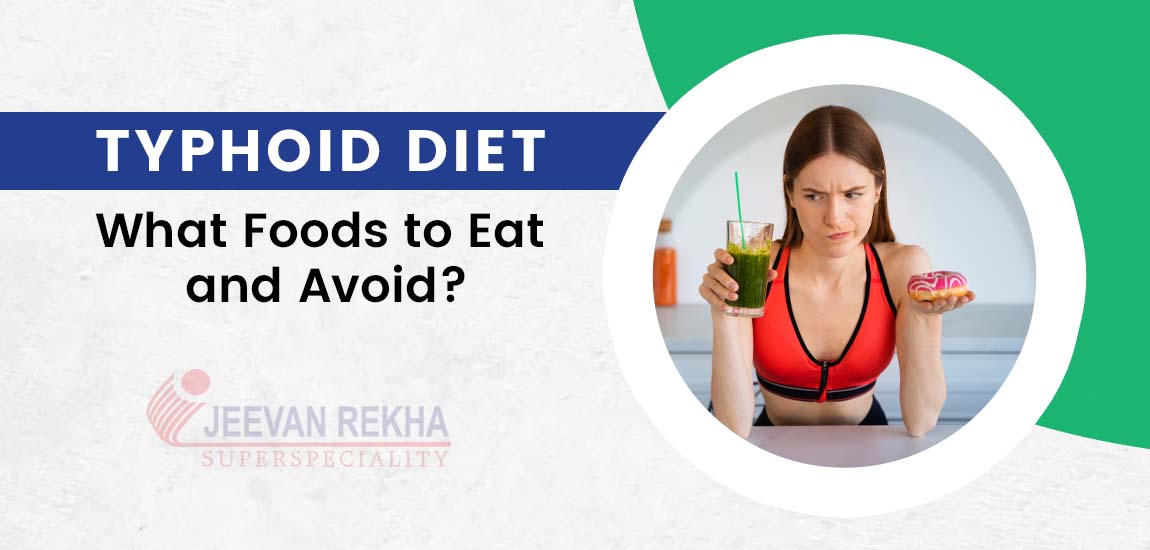
- By JRSH Admin
- In Health and Tips,
- Posted January 25, 2023
Typhoid Diet: What Foods to Eat and Avoid?
A bacterial condition called typhoid spreads through contaminated food and drink. It is brought on by the bacteria Salmonella typhi. Following typhoid, you could have a high fever.
Chills, sweating, headaches, bodily aches, and abdominal pain are all symptoms of typhoid fever. After having close touch with the faeces of someone who has the disease, you could contract typhoid. Therefore, it is essential to thoroughly wash your hands after using the restroom.
You can suffer diarrhoea or constipation and lose your appetite if you have typhoid. You feel weak from these symptoms, and you might lose weight quickly. Therefore, maintaining a healthy diet when suffering from typhoid is crucial to stopping this bacterial infection.
Food-related discomfort from typhoid makes it essential to keep a modest and balanced diet. Additionally, you need to eat a diet heavy in calories and protein. To recover from typhoid, it's also crucial to drink lots of water.
Typhoid fever Symptoms
The disease's signs and symptoms are likely to occur gradually, frequently one to three weeks after contact.
Early illness:
Signs and symptoms include:
- A low-grade fever that gradually rises each day, possibly rising to 104.9 F (40.5 C)
- Headache
- Fatigue and weakness
- Dry cough
- Decrease in appetite and weight
- Muscle pain
- Sweating
- Stomach pain
- Diarrhea or constipation
- Rash
- Extremely swollen stomach
Later illness:
Without treatment, you may:
- Feeling delirious
- The typhoid state is when you are completely exhausted, motionless, and have your eyes closed.
- Oftentimes at this point, life-threatening complications appear.
After the fever has subsided, signs and symptoms in some people may come back for up to two weeks.
Benefits of Typhoid Diet Chart
Despite the paucity of research on the typhoid diet in particular, studies suggest that low-fiber diets may benefit a number of gastrointestinal disorders.
In fact, low-fiber diets are occasionally used to treat irritable bowel syndrome (IBS), a condition marked by symptoms like gas, bloating, and diarrhea.
According to studies, eating bland foods with little fiber, such as white rice, bananas, applesauce, and toast, may help with diarrhea.
Furthermore, research points to a potential benefit of limiting spicy foods.
For instance, according to some studies, gastrointestinal disorders sufferers who consume acute amounts of chili may experience worsening stomach pain and burning.
Typhoid Diet - What Foods to Eat?
We all know that preventing a problem is always better than fixing it. You are more likely to develop serious illnesses if you don't follow a healthy diet. Adequate nutrient intake will aid in disease prevention. A diet plan for people with typhoid similarly places a strong emphasis on boosting immunity.
The symptoms of typhoid fever vary and develop gradually over several weeks. Therefore, foods that are simple to digest must be included in your typhoid diet plan. Typhoid symptoms that recur frequently are digestive discomforts. Therefore, it's important to include foods that are simple to digest in your diet.
The victim of typhoid has incredibly fragile physical health. Patients experience nausea and appetite loss. They must therefore adhere to a healthy diet plan in order to regain their strength.
When dealing with typhoid, people should include the following foods in their diet:
- Food with a High Calorie Content: Typhoid patients should eat bland food that is high in calories while still meeting their needs. This kind of diet will assist in restoring patients' lost weight. Foods that are high in calories include bread, cereals, boiled potatoes, and others.
- Carbohydrate-rich foods: Carbohydrates give the body the energy it needs. Porridge, baked potatoes, boiled rice, and other foods that are high in carbohydrates can all be included in a person's diet plan. Because they are easier to digest in a semi-solid form, patients can consume them.
- Drink lots of water: Typhoid may cause severe dehydration. Staying hydrated is crucial when suffering from typhoid fever. Additionally, patients who drink liquids will receive the nutrients they need and keep the fluid balance in their bodies. Fruit juices, buttermilk, water that has been fortified with electrolytes, and other liquids are available for patients to consume.
- Dairy Products: Patients should consume dairy products in large quantities. Dairy products, such as milk, yoghurt, paneer, etc., make up for the body's lack of protein. Within a few weeks, yogurt's bifidobacteria can stop bloating and smooth bowel movements. Additionally, incorporating milk and curd into your typhoid diet expedites the healing process.
- Indulge in soups: Soups are an absolute guarantee. Both their preparation and digestion are simple. Additionally, it feeds your body with nutrients. Typhoid patients can prepare spinach soup, chicken soup, or any other soups of their choosing and consume them.
- Eat cooked vegetables: If you have typhoid, substitute cooked vegetables for raw ones in your diet. Vegetables that are cooked, such as carrots, beans, potatoes, beets, and squash, have little fiber. These are very nutritious for your body, though, and are simple to digest.
- Take boiled moong dal: Protein, which is abundant in lentils, promotes a swift recovery from illness. Lunch will be moong dal cooked in a pressure cooker. It is very nourishing and gives you a prolonged feeling of fullness. One of the most essential components of the diet for typhoid patients is moong dal.
- Eat bananas: Bananas are enriched with beneficial fibers that give your body energy. Typhoid must be fought by keeping your body energized. Consequently, you must incorporate bananas into your typhoid diet strategy.
- Eat honey: You need to include honey in your typhoid diet as one of the foods. Typhoid patients who need sugar can get it from honey. Additionally, typhoid-causing bacteria are affected by its antibacterial properties. Consuming honey along with hot water has a calming effect on the intestines.
- Food Rich in Omega-3 Fatty Acids: Consuming foods high in omega-3 fatty acids can help the body feel less bloated and inflamed. Typhoid food should be very nourishing and full of omega-3 fatty acids. Omega-3 fatty acids are abundant in foods such as soybeans, almonds, and eggs.
What Foods Should You Avoid During Typhoid?
You should be aware of both the recommended typhoid diet and the foods to stay away from while sick with typhoid. They are:
- High-fibre Food: Due to their difficulty in digestion, foods high in fibre will upset the patient's digestive system. Foods that stress the stomach, such as oats, barley, etc., ought to be avoided.
- Raw Food: Steer clear of eating raw, unpeeled fruits or vegetables as they may contain contaminants that are harmful to your health.
- Spicy and fatty foods: Typhoid patients should avoid foods that are spicy or fatty because they will irritate their digestive systems and cause inflammation. Examples of such foods include vinegar, jalapenos, paprika, and chilli.
- Ghee and Butter: Although it is advised to consume dairy products, fatty foods like ghee, butter, mozzarella, etc., are difficult to digest and can cause additional problems.
Additionally, avoid consuming foods that cause gas and bloating, such as cabbage, asparagus, cauliflower, etc., and stay away from foods like onions and garlic because they can cause inflammation. Avoid high-fiber foods because they are difficult to digest and may interfere with the digestive system's normal operation.
Overall, a diet plan for typhoid patients needs to be carefully considered. It is effective to combat the symptoms by adopting a healthy diet. Keeping an eye on your diet while you are sick with typhoid is therefore crucial. To avoid negative effects, adhere to the recommended typhoid diet.
Conclusion
The fact that typhoid is a dangerous medical condition must be emphasised. Always tell your doctor about your symptoms and ask for their expert guidance on any dietary modifications or prescription medications. All of the above-mentioned meals are merely a supplement to medication and should not be used to treat typhoid.
Tags
Blog Search
Latest Posts
-
Mild Heart Attack: How Serious Is It?
February 19, 2026 -
Skin Ulcers Uncovered: Causes, Types, Symptoms, and Healing Options
January 13, 2026 -
Is Coconut Water Safe During Pregnancy? Benefits, Risks & Myths
January 08, 2026 -
Dark Circles Under The Eyes: Causes, Home Remedies and Treatments
December 21, 2025 -
बर्ड फ्लू के लक्षण, कारण, उपचार और बचाव के उपाय जानें
December 04, 2025




